| Listing 1 - 10 of 13 | << page >> |
Sort by
|
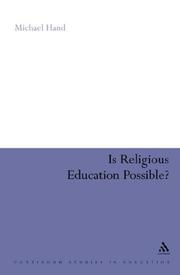
ISBN: 0826491502 9780826491503 Year: 2006 Publisher: New York Continuum
Abstract | Keywords | Export | Availability | Bookmark
 Loading...
Loading...Choose an application
- Reference Manager
- EndNote
- RefWorks (Direct export to RefWorks)
Religious education --- Philosophy. --- Religious education (Theology) --- Philosophy --- Religious education - Philosophy.
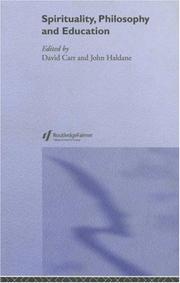
ISBN: 0415296692 0203464907 9780203464908 9780415296694 113443460X 1138008656 1280051256 9781134434558 9781134434596 9781134434602 9781138008656 1134434596 Year: 2003 Publisher: London RoutledgeFalmer
Abstract | Keywords | Export | Availability | Bookmark
 Loading...
Loading...Choose an application
- Reference Manager
- EndNote
- RefWorks (Direct export to RefWorks)
The possibilities and importance of a spiritual dimension to education are subjects receiving increased consideration from educational practitioners, policymakers and philosophers. Spirituality, Philosophy and Education brings together contributions to the debate by a team of renowned philosophers of education. They bring to this subject a depth of scholarly and philosophical sophistication that was previously missing, and between them offer a wide-ranging exploration and analysis of what spiritual values have to offer contemporary education.The contributors address such subjects
Spirituality --- Religious education --- Teaching --- Religious education (Theology) --- Spiritual-mindedness --- Philosophy --- Religion --- Spiritual life --- Study and teaching. --- Philosophy. --- Religious aspects. --- Religious aspects --- Christianity.
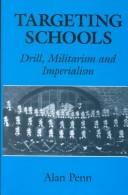
ISBN: 0713040394 0713002182 9781315865560 1315865564 9781317958086 131795808X 9781317958079 1317958071 9781317958062 1317958063 9780713002188 9780713040395 Year: 1999 Publisher: London Woburn
Abstract | Keywords | Export | Availability | Bookmark
 Loading...
Loading...Choose an application
- Reference Manager
- EndNote
- RefWorks (Direct export to RefWorks)
291.1 --- #PBIB:2000.1 --- Godsdienstfilosofie --- Lerarenopleiding --- (vak)didactiek menswetenschappen --- (vak)didactiek menswetenschappen. --- 291.1 Godsdienstfilosofie --- Critical realism --- Liberalism --- Religious education --- Religious education (Theology) --- Liberal egalitarianism --- Liberty --- Political science --- Social sciences --- Philosophy, Modern --- Realism --- Philosophy
Book
ISBN: 9781441114426 1441114424 9781441119094 9781441136565 Year: 2015 Publisher: London Bloomsbury Academic
Abstract | Keywords | Export | Availability | Bookmark
 Loading...
Loading...Choose an application
- Reference Manager
- EndNote
- RefWorks (Direct export to RefWorks)
What does it mean to understand a religion?How should the concept of truth be addressed in the contemporary classroom?What is the proper subject matter of religious education and how does it relate to other subjects and the school curriculum as a whole?Despite the prevalence of literature on these subjects, these issues are far from resolved and consequently the place and nature of religious education in our schools is precarious and confused. A Hermeneutics of Religious Education argues that although the tradition of philosophical hermeneutics has transformed both educational thought and the academic discipline of religious studies, the literature of religious education pedagogy has paid only limited attention to these developments. To engage with them fully entails a transformation of our understanding of religious education and its importance in a curriculum of the twenty-first century.
Religious education --- Philosophy. --- 268.22 --- Ethical education --- Theological education --- Education --- Moral education --- Religious education (Theology) --- Geloofsopvoeding op school--(algemeen) --- 268.22 Geloofsopvoeding op school--(algemeen) --- Philosophy --- Religious education - Philosophy. --- Religious education - England. --- Religious education - Wales.
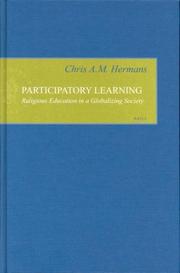
ISSN: 13891189 ISBN: 128046738X 9786610467389 1423711084 904740212X 9781423711087 9789047402121 9789004130012 9004130012 9004130012 Year: 2003 Volume: 9 Publisher: Leiden Brill
Abstract | Keywords | Export | Availability | Bookmark
 Loading...
Loading...Choose an application
- Reference Manager
- EndNote
- RefWorks (Direct export to RefWorks)
In many respects children and youths receiving religious instruction in our culture resemble extraterrestrial beings doing an orientation course. Religion and religiosity are unknown quantities which they have hardly encountered at home. Religion seems something else, something greater. This book is a study of the foundations of religious education, centered around six concepts: religion in a globalizing society, religious tradition, religion, the religious self, learning through participation and interreligious learning.
Religious education --- Globalization --- Religious education (Theology) --- Philosophy. --- Religious aspects. --- 268 --- Religious aspects --- Philosophy --- Catechese. Godsdienstonderwijs --- Religious studies --- Sociology of religion --- Didactics of religion --- Religious education - Philosophy. --- Globalization - Religious aspects.
Book
ISBN: 1621890953 9781621890959 9781608996971 1608996972 Year: 2011 Volume: 169 Publisher: Eugene, Or.
Abstract | Keywords | Export | Availability | Bookmark
 Loading...
Loading...Choose an application
- Reference Manager
- EndNote
- RefWorks (Direct export to RefWorks)
Learning in a Musical Key examines the multidimensional problem of the relationship between music and theological education. Lisa Hess argues that, in a delightful and baffling way, musical learning has the potential to significantly alter and inform our conception of the nature and process of theological learning. In exploring this exciting intersection of musical learning and theological training, Hess asks two probing questions. First, What does learning from music in a performative mode require? Classical modes of theological education often founder on a dichotomy between theologically musical and educational discourses. It is extremely difficult for many to see how the perceivedly nonmusical learn from music. Is musicality a universally human potential? In exploring this question Hess turns to the music-learning theory of Edwin Gordon, which explores music's unique mode of teaching/learning, its primarily aural-oral mode. This challenge leads to the study's second question: How does a theologian, in the disciplinary sense, integrate a performative mode into critical discourse? Tracking the critical movements of this problem, Hess provides an inherited, transformational logic as a feasible path for integrating a performative mode into multidimensional learning. This approach emerges as a distinctly relational, embodied, multidimensional, and non-correlational performative-mode theology that breaks new ground in the contemporary theological landscape. As an implicitly trinitarian method, rooted in the relationality of God, this non-correlational method offers a practical theological contribution to the discipline of Christian spirituality, newly claimed here as a discipline of transformative teaching/learning through the highly contextualized and self-implicated scholar into relationally formed communities, and ultimately into the world.
Music --- Theology --- Religious education --- Religious education (Theology) --- Education, Theological --- Theological education --- Christian education --- Religious aspects --- Christianity. --- Study and teaching. --- Philosophy. --- Performative (Philosophy) --- Music - Religious aspects - Christianity. --- Theology - Study and teaching. --- Religious education - Philosophy.
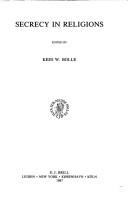
ISSN: 01698834 ISBN: 9004083421 9004378685 9789004083424 Year: 1987 Volume: 49 Publisher: Leiden, Boston: Brill,
Abstract | Keywords | Export | Availability | Bookmark
 Loading...
Loading...Choose an application
- Reference Manager
- EndNote
- RefWorks (Direct export to RefWorks)
Secrecy --- Secret --- Religious aspects --- Comparative studies --- Aspect religieux --- Etudes comparatives --- 291.211.8 --- -Concealment --- Privacy --- Hiding places --- Taboe --- -Comparative studies --- -Taboe --- 291.211.8 Taboe --- -291.211.8 Taboe --- Concealment --- Religious aspects&delete& --- Geheim / in de godsdienst. (Versch. onderwerpen) --- Godsdiensten. (Versch. onderwerpen) --- Mystère. (Mélanges) --- Secret / dans la religion. (Mélanges) --- Religions. (Mélanges) --- Mysterie. (Versch. onderwerpen) --- Religious education --- Religious education (Theology) --- Comparative studies. --- Philosophy.
Book
ISBN: 365821676X 3658216778 Year: 2018 Publisher: Wiesbaden : Springer Fachmedien Wiesbaden : Imprint: Springer VS,
Abstract | Keywords | Export | Availability | Bookmark
 Loading...
Loading...Choose an application
- Reference Manager
- EndNote
- RefWorks (Direct export to RefWorks)
The authors of this volume examine theory and practice regarding past and present roles of Jewish, Christian and Islamic religious education in nurturing tolerance, interpreted as mutual respect for and recognition of other groups, in Eastern (Albania, Bulgaria, Kosovo, Macedonia, Moldova, Montenegro and Romania) and Western (Finland, Germany, Italy, Latvia and Spain) Europe, Israel, Nigeria and Uzbekistan. They also explore potential roles of religion and exclusivism in fostering (Islamic state, NGOs, etc.), but also averting (Islamic legal theory, authority, Sufism, etc.) radicalization, and of secular states in allowing, but also banning minority religious education in public schools. With contributions from Friedrich Schweitzer, Martin Rothgangel, Gerhard Langer, Daniela Stan, Arto Kallioniemi, Juan Ferreiro Galguera, Maria Chiara Giorda, Rossana M. Salerno, Viorica Goraş-Postică, Constantin Iulian Damian, Valentin Ilie, Dzintra Iliško, Ayman Agbaria, Zilola Khalilova, Raid al-Daghistani, Osman Taştan, Moshe Ma’oz, Adriana Cupcea, Muhamed Ali, Rüdiger Lohlker and Dele Ashiru. The Editors Ednan Aslan is the Chair of Islamic Theological studies at the University of Vienna where he is a Professor for Islamic Education. Margaret Rausch is scholar, researcher and university instructor in the field of Islamic and Religious Studies.
Religious education --- Philosophy. --- Religious education (Theology) --- Religion and sociology. --- Islam-Doctrines. --- Religion and education. --- Judaism-Doctrines. --- Theology. --- Sociology of Religion. --- Islamic Theology. --- Religion and Education. --- Jewish Theology. --- Christian Theology. --- Religion and society --- Religious sociology --- Society and religion --- Sociology, Religious --- Sociology and religion --- Sociology of religion --- Sociology --- Christian theology --- Theology --- Theology, Christian --- Christianity --- Religion --- Islam—Doctrines. --- Church and education. --- Judaism—Doctrines. --- Education and church --- Education
Book
ISBN: 3786722269 Year: 2000 Publisher: Mainz Matthias-Grünewald
Abstract | Keywords | Export | Availability | Bookmark
 Loading...
Loading...Choose an application
- Reference Manager
- EndNote
- RefWorks (Direct export to RefWorks)
Christian education --- Education --- Religious education --- Theological anthropology --- #PBIB:2001.1 --- Man (Christian theology) --- Religious education (Theology) --- Children --- Education, Primitive --- Education of children --- Human resource development --- Instruction --- Pedagogy --- Schooling --- Students --- Youth --- Civilization --- Learning and scholarship --- Mental discipline --- Schools --- Teaching --- Training --- Christian education (Theology) --- Philosophy --- Religious aspects --- Christianity --- Peukert, Helmut. --- Political philosophy. Social philosophy --- Christian moral theology --- Educational sciences
Book
ISBN: 9783830933182 3830933185 9783830983187 Year: 2015 Publisher: Münster Waxmann
Abstract | Keywords | Export | Availability | Bookmark
 Loading...
Loading...Choose an application
- Reference Manager
- EndNote
- RefWorks (Direct export to RefWorks)
Religious education --- Religious education of children. --- Holistic education. --- 268.222 --- Education --- Interdisciplinary approach in education --- Children --- Religious education (Theology) --- 268.222 Schoolcatechese. Godsdienstonderwijs--(doelstellingen; inhoud; methodes) --- Schoolcatechese. Godsdienstonderwijs--(doelstellingen; inhoud; methodes) --- Philosophy. --- Didactics of religion --- Educational sciences --- Religious education of children --- Holistic education --- Philosophy
| Listing 1 - 10 of 13 | << page >> |
Sort by
|

 Search
Search Feedback
Feedback About UniCat
About UniCat  Help
Help News
News